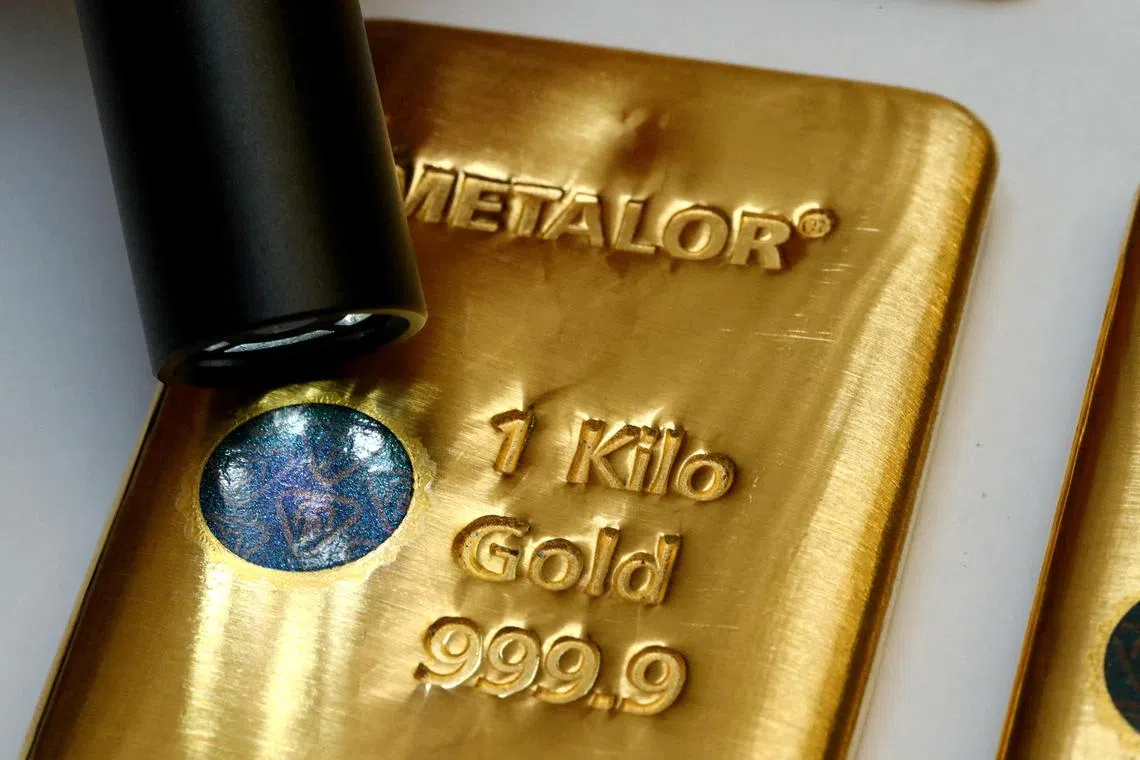Singapore investors buy 2.5 tonnes of gold bullion in Q1, the most since 2010
Sign up now: Get ST's newsletters delivered to your inbox

Singapore demand was up 35 per cent year on year, the highest since records began by World Gold Council.
PHOTO: REUTERS
SINGAPORE – Singapore investors’ appetite for bullion remained strong in the first quarter of 2025 amid a record high-price environment, in which gold surpassed US$3,000 an ounce.
Their demand for gold bars and coins rose 35 per cent year on year to 2.5 tonnes, the highest since records began by World Gold Council (WGC) in 2010. The gold investment demand in Indonesia, Malaysia and Thailand also grew steadily at double-digit year-on-year rates, according to the first quarter gold demand report released by WGC on April 30.
Vietnam, however, saw the demand for gold bars and coins drop 15 per cent on the year to 12 tonnes of gold purchased. This was attributed to higher premiums on the limited availability of gold products, as well as local currency depreciation, said WGC.
Gold jewellery demand declined across the Asean countries, aligning with the global trend amid record-high gold prices. Singapore, in particular, saw the demand fall 20 per cent on the year, at 1.7 tonnes of gold jewellery purchased.
Mr Fan Shaokai, head of Asia-Pacific (ex-China) and global head of central banks at WGC, noted that the global jewellery demand recorded its lowest level since the demand was stifled by the Covid-19 pandemic in 2020, which was “unsurprising” given that gold hit 20 all-time price highs in the first quarter.
Central banks’ demand dips
Global central banks entered their 16th consecutive year of net buying with 243.7 tonnes of gold added to their reserves in the first quarter, driven by the need for portfolio diversification, risk management, inflation hedging, and protection against geopolitical and market volatility, noted Mr Fan. This was, however, down 21 per cent from the 309.9 tonnes purchased in the same quarter in 2024.
Despite the fall, the demand, in absolute terms, was still “healthy” at 24 per cent above the five-year quarterly average, and 9 per cent below the average over the last three years of elevated demand, highlighted WGC.
In particular, the Monetary Authority of Singapore sold three tonnes of gold in the quarter, maintaining its total gold holdings at about 220 tonnes.
Overall gold demand
Global gold investment demand, comprising both gold-backed exchange-traded funds (ETFs), as well as bars and coins surged 170 per cent year on year to 551.9 tonnes. This was driven by a strong revival of demand for gold ETFs, registering net inflows of 226.5 tonnes, compared with net outflows of 113 tonnes the same period in 2024.
The overall gold demand remained steady at 1,206 tonnes, a 1 per cent increase on the year. This includes demand for investment, jewellery fabrication, central bank purchases and technology uses.
“Amidst the ongoing geopolitical tensions and global market volatility, gold, a traditional safe haven asset, continues to perform strongly with global gold demand reaching its highest first-quarter level since Q1 2016,” said Mr Fan.
Outlook for 2025
WGC expects near-term stagflation risks, medium-term recession risks, elevated stock-bond correlations, an expected acceleration in US deficits, and continued geopolitical tensions to continue to drive gold demand for investment.
Ms Louise Street, senior markets analyst at WGC, said: “Looking ahead, the broader economic landscape remains difficult to predict, and that uncertainty could provide upside potential for gold.”
Demand for gold bars and coins, specifically, is expected to “stay resilient rather than strong”, given that surging prices would temper geopolitical risk motives, said WGC, noting gold jewellery demand to be weaker than expected.
“Any stronger jewellery recycling response may be tempered by low near-market stocks, trade-ins, old-gold collateral activity, and little distress-driven selling,” added WGC. THE BUSINESS TIMES


